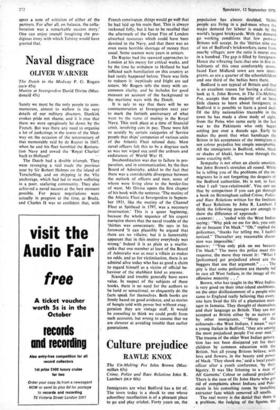Naval disgrace
OLIVER WARNER
The Dutch in the Medway P. G. Rogers (our. 45s) Mutiny at Invergordon David Divine (Mac- donald 45s)
Surely we must be the only people to com- memorate, almost to wallow in the very details of our military disasters. Dunkirk evokes pride not shame, and it is true that there we were egregiously let down by the French. But was there any need to organise a lot of junketings in the towns of the Med- way on the occasion of the tercentenary of that memorable raid by de Ruyter in 1667, when he and his fleet humbled the Restora- tion Navy and towed the 'Royal Charles' back to Holland?
The Dutch had a double triumph. They were revenging a raid made the previous year by Sir Robert Holmes on the island of Terschetling, and on shipping in the Vlie anchorage, which had led to much suffering in a poor, seafaring community. They also achieved a naval success at the best moment possible. For peace negotiations were actually in progress at the time, at Breda, and Charles II was so confident that, with French connivance, things would go well that he had laid up his main fleet. This is always reckoned folly, but it has to be recalled that the aftermath of the Great Fire of London absorbed resources which could have been devoted to the Navy, and that there was an even more horrible shortage of money than usual. Some seamen were years in arrears.
De Ruyter had the seaward approaches to London at his mercy for critical weeks, and by the time he withdrew to Holland he had inflicted such humiliation on this country as had rarely happened before. There was little to redeem it: ineptitude and fright are sad sisters. Mr Rogers tells the story with un- common clarity, and he includes for good measure an account of the background to the maritime wars with the Dutch.
It is safe to say that there will be no commemoration at Invergordon next year to mark the fortieth anniversary of what went by the name of mutiny in the Royal Navy. This took place at a time of financial crisis, involving cuts in pay. These were felt so acutely by certain categories of Service people that ships' companies of various units of the Atlantic Fleet refused duty. Most naval officers felt this to be a disgrace such as was not wiped out, until the ardours• and endurances of World War II.
Insubordination was due to failure in pre- paration, and in communication, by the then Board of Admiralty, added to the fact that there was a considerable divergence between the outlook of officers and men, some of whom were living close to the border-line of want. Mr Divine opens the first chapter of his book with the sentence. 'The mutiny of the Atlantic Fleet at Invergordon in Septem- ber 1931, like the mutiny of the Channel Fleet at Spithead in 1797, was a necessary insurrection.' This is a queer beginning, because the whole sequence of his cogent narrative shows that the naval trouble of the 'thirties was unnecessary. He says in his foreword It can plausibly be argued that there are no villains; but it is lamentably apparent that in this mutiny everybody was wrong.'- Indeed it is as plain as a marlin- spike that one member at least of the Board of Admiralty was as near a villain as makes no odds, and as for victimisation, there is an admiral alive today who has as good a claim to regard himself as a victim of official be- haviour. of the shabbiest kind as anyone.
Scandal and trouble generally have news value. In respect of the subjects of these books, there is no need for the authors to be lurid or sensational, so eloquently do the facts speak for themselves. Both books are firmly based on good evidence, and as stories of bungle told with power but without exag- geration they are vintage stuff. It would be consoling to think we could profit from such accounts, but wrong to assume that we are cleverer at avoiding trouble than earlier generations.














































 Previous page
Previous page